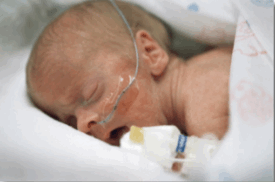PT 861 - The High Risk Infant
THE 'HIGH-RISK' INFANT: Principles of early care
- Development is a continuous process that finds its roots in prenatal development, a time when the fetus takes advantage of a predictable environment to organize and practice basic sensory-motor behaviours that will help him or her adjust to the demands of the external environment at birth. This learning opportunity is not available to pre-term infants who present at birth with disorganized behaviours that challenge successful transitioning to post-natal life, as well as altering the trajectory of early development. In this module, we will discuss these challenges and learn the role of physiotherapists in providing 'developmentally supportive' care for pre-term infants.
At the end of this learning module, students will be able to:
- Compare and contrast the expected behaviour of pre-term and full-term infants, and discuss differences from a perspective of systems development.
- Describe the etiology, signs and symptoms of common medical complications associated with pre-term and low birth weight.
- Discuss the relationship between prematurity, ventilatory care and periventricular leukomalacia (PVL) and intraventricular hemorrhage (IVH), two conditions that are strongly associated to cerebral palsy.
- Apply the principle of 'developmentally supportive care' in designing a plan of intervention for a pre-term infant with limited medical complications.
- Development is considered to be dynamic in nature, being shaped by the interaction between the infant and his or her environment. Pre-natal brain development benefits from similar processes of dynamic 'shaping', as the internal environment of the womb, in healthy pregnancy, provides an optimal sensory context to support the emerging sensory-motor functions of the brain. Pre-term birth alters the conditions of this 'shaping', placing the infant in an environment in which sensory and physical demands often far exceed the infant's capabilities. Early care focuses on helping the pre-term infant make sense of his or her environment and to begin organizing effective adaptive behaviours.
